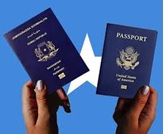By Isak Abdi and Tendai Chavuta
We have read the opinion piece on divided loyalties: dual citizenship by Mohamed Irbad and Mahad Wasuge with interest. While the debate is important, we are of the view that is largely opportunistic and useless in several ways.

First the discussion looks rather opportunistic. Questions must be asked as to why the current President Mohamed Abdullahi Farmajo renounced his American citizenship? The fact that President Farmajo renounced his citizenship does not make it law and even ideologically correct. Whatever reasons will be put forward or have already been made, I don’t think that they should hold sway in deciding the fate of millions of Somalis who hold dual citizenship.
The second issue is that the discussion seems rather divisive in a country that has been searching for reconciliation and unity after so many years of civil strife. The fact of the matter is that Somalis have lived abroad for years. Somalia’s daughters and sons do not need to be solely Somali for them to be able to contribute to the development and administration of the country.
Questions arise. So, if a Somalia-American renounces his or her American citizenship, does it mean that he or she can never reclaim it again? we don’t know the answer to this administrative question but if it is possible then it could leave Somalia with opportunistic leaders who claim to be Somali when it suits them and revert when it does not.
The discussion poses serious questions with regards to the contribution of the so-called Somali diaspora and the Somali in Somalia who is regarded as the native. These discussions are clear in everyday discussions with Somalis from home who view with disdain and envy the diaspora Somali who seems more educated, speaks English, Arabic, Italian better and is regarded as more “experienced” than the local Somali. On the other side, the local Somali thinks that he or she is better off as he or she understands the local context better than the “foreigner”.
To want to fan these differences on top of the very toxic clan differences is to try to be mischievous politically. So, what now, the CITIZENSHIP is now the new clan? We sense a ploy to exclude some players from the political field. The exclusionary nature of such politics has been used before in Zambia, DRC, Malawi, Zimbabwe and other African countries to keep competitors from political offices by the incumbents.
More than anything else, this discussion apart from the rather useless issues around security and allegiance to Somalia, is opportunistic, divisive and unnecessary.
Who am I and where am I from?
Younger Somali generations who left Somalia as children or were born and raised overseas have different identity issues and methods of engagement with the homeland. Socialized and educated in Western countries, they often find themselves between two cultures and do not feel a complete part of either. Therefore questions of ‘who are you?’ and ‘where are you from?’ evoke different responses depending on which country they reside in, their relationships with their parents and their understanding of Somali identity. Likewise their understanding of what it means to be Somali and of issues like the Somali clan structure, which is taught to them by their parents, both shapes and is shaped by their interactions with their family and friends.
A more fundamental question would be to ask: Who is a Somali? – the one who lives and resides in Somalia; the one who was born in Somalia, the one who was born outside Somalia ,the one who holds foreign citizenship ?
Co-authored by Isak Abdi and Tendai Chavuta
Email:isaaqsom@gmail.com

Leave a Reply